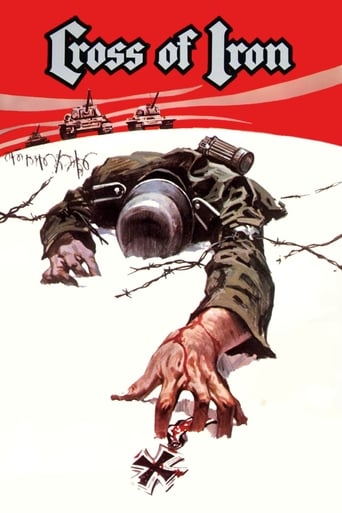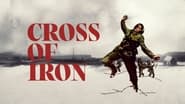robertmaybeth
Based on the novel of the same name, this film is one of Peckinpah's best films. The ambition of Peckinpah's efforts are shown by the large scale of the events shown, and you truly get a feel of the story he was trying to tell. But something gets lost in the translation from book to film, and this film is at times too subtle or too overt, with a lot of the subtleties of the characters getting lost in the process. Despite a fine cast, with many first rate actors, the movie aims high but just doesn't quite achieve the scope Peckinpah was going for.And what a cast it is, too. Including James Coburn, James Mason and Maximilian Schell, the chemistry between them proves to be one of the best parts of this movie. Coburn plays Sergeant Steiner, a man too long in the war and too jaded to be false in any way. His superior Captain Stransky (Schell) needs Steiner's help to vouch for him so he can get the Iron Cross medal he is obsessed with getting. Schell will go to any lengths to get the medal, and tries to convince Steiner to vouch for him regarding a battlefield event (that didn't happen the way Stransky said it did). Steiner, predictably, dislikes officers almost as much as he hates the war, and refuses to do it. At one point Steiner throws his own Iron Cross on Stansky's desk and blurts, "Here, take it!" but nothing less then a real Iron Cross will do. The two continue to be in conflict for the rest of the film, all done in a very murky subplot that is sometimes unclear - the main issue I have with this movie. This was obviously a herculean effort by Peckinpah, and despite the muddy subplot that the film centers around, the battle scenes are fairly well done. Filmed partly in Croatia - that was still firmly in the Communist Bloc at the time of filming - the battle scenes feature genuine T-34 tanks along with dozens of extras during the Russian assault scenes and give the movie a real touch of authenticity. Set in spring 1943 - one of the rare lulls in the Ostfront between Stalingrad and the colossal battle at Kursk - it does manage to give a sense of the overwhelming enemy facing the German Wehrmacht during all stages of the war. There's enough great battle scenes here to distract from the, somewhat weak subplot and to show what war in the mud of Russia might have been like. Unfortunately the movie has a relatively weak ending - Steiner and Stransky are still alive but still battling on at the end. So the ultimate fate of the two strongest characters is left untold.All in all a great war movie, if a little frustrating to interpret while viewing.
cinemajesty
Film Review: "Cross of Iron" (1977)From the director Sam Peckinpah (1925-1984), responsible for the outstanding western "The Wild Bunch" from the year 1969, comes this World War II movie told from the perspective of German officer Rolf Steiner, portrayed by remorseless striving perfectly-cast actor James Coburn (1928-2002), leading his platoon through the ambushing Eastern borderlands. Actor Maximilian Schell (1930-2014) as his commanding supervisor, as well as match-making cast Hauptmann Stransky, sitting in the bunker near the radio in order to direct the hopelessly front-running at the Russian frontier of year season 1942/1943. The screenplay based on a war-digesting book by Willie Heinrich (1920-2005) has been in creative hands with director Sam Peckinpah, who indulges on his trademark directions in-production with slow-motion action shots of blood and dirt-sprinkling proportions and in post-production daring editorial shot combinations that "Cross of Iron" stands out in the crowd of War movies, again a picture to be discovered with younger audiences to comprehend horrors of war and the consequences every man has to encounter in the aftermath; precisely captured by the director with the eventually consolidated main characters in battle stating final words of forfeited fighting with Stransky saying "I will show you how Prussian officers fight" in which Steiner coolly replies "And I will show you where the Iron Crosses grow."© 2017 Felix Alexander Dausend (Cinemajesty Entertainments LLC)
Robert Thompson (justbob1982)
Version I saw: UK bluray releaseActors: 6/10Plot/script: 6/10Photography/visual style: 6/10Music/score: 7/10Overall: 6/10Sam Peckinpah was one of the most respected directors was one of the most respected American directors of his generation. He specialized in westerns such as The Wild Bunch (especially), and more generally went for adventure stories with a shade more subtlety than straight-up boys'-own swashbucklers.Late on in his career, he took on an interesting task in Cross of Iron: a Second World War film told from the perspective of the German soldiers. In any such film, there are a couple of elephants in the room: Nazism and defeat. While Nazism can be covered, and indeed has been covered in the past, from other perspectives such as the Allied soldiers, or German civilians, this point of view has the unique colouring that we know they are destined to lose. If any happy ending is to happen for the main characters (and it may well not), it will be contrasted with the fate of their fellow soldiers.In Cross of Iron, this is partly dealt with by isolating Sgt Steiner (James Coburn) and his squad behind enemy lines, and forcing them to make a daring trek through enemy territory. This cuts them off from the main pressures of the background, and allows the writers to bring them in on a controlled basis.The main conflict, apart from against the Soviet army, is between Steiner and Capt. Stransky (Maximilian Schell), a political commissar of sorts who, while he claims not to be a Nazi party member, enforces their ideology over Steiner's seemingly more noble, practical approach. The main underlying thrust of the film is an anti-war message, that those at the top do not understand the brutality of the front line, and so resort to armed conflict entirely too frivolously.When it comes down to it, though, the film is mainly a straight adventure, with very limited subtlety. The 'subtext' is even transformed into a supertext when it is spoken directly by Steiner: "I hate officers." It seems that, by his third-to-last film, Peckinpah had perfected his formula, enabling him to produce a strong, exciting adventure film with a bit of depth, without straying far from his comfort zone. However, he had also become somewhat set in his ways. There is a great deal of narrative and thematic potential in the central idea, I think, but Peckinpah had lost some of the flexibility to explore it.
TankGuy
Our story begins on the punishing wasteland of the eastern front in 1943. The gallant but disillusioned Sgt. Steiner(James Coburn)has been awarded the coveted iron cross for bravery in combat. Steiner's new commanding officer Capt. Stransky(Maximillian Schell)a supercilious Prussian aristocrat, hungers for nothing more than personal glory and the chance to earn his own iron cross. It isn't long before a bitter contempt develops between the two men, as the jaded Steiner realises that Stransky is a dangerously deluded coward. With the red army pushing the Germans back, contempt turns to disgust after Stransky takes credit for the heroic actions of Steiner and his men and leaves them at the mercy of the Soviets.Steeped in deliciously morbid cynicism, Sam Peckinpah's only war movie captures military life on the hellish eastern front with unparalled skill. Deeply rooted in satire, never have I had the pleasure to enjoy an (anti)war movie so raw, so mesmerising, so flawless. The hauntingly dreamlike imagery does nothing short of dazzle and the poignant atmosphere of muddy trenches fills ones nostrils with the nauseating stench of war. As far as war movies go, Orson Welles said that Cross Of Iron was the greatest he had ever seen. I am inclined to agree, if it wasn't for stiff competition from classics like Patton, A Bridge Too Far or Attack!. The performances are nothing short of brilliant. James Coburn and Maximillian Schell dazzled in their portrays. The one and only James Mason was also on fine form as the war weary Colonel Brandt. A hoard of competent European talent also flex their acting muscles in supporting roles. With a flawless script, Cross Of Iron is just as much a study of class relations as it is a study of war. The battle of wits between the demoralised Steiner and the priggish Stransky is just as gripping as the physical battles between soldiers and tanks. Steiner is a man more loyal to his men than he is to his country. His only goal is to survive the carnage which surrounds him. Officers and medals mean nothing to him whatsoever, describing his iron cross as nothing more than "a worthless piece of metal". Stransky on the other hand, has his loyalties driven by an almost erotic obsession to win the iron cross. Like most members of the upper classes, he views war through rose tinted glasses, a trait which eventually leads to his undoing.The explosive but bizarre climax oozes with darkly comic humour. As a matter of fact, the entire movie does, although the black humour is at its greatest near the end of the movie. The film itself is a metaphor for insanity, with insanity shamelessly represented by the climax. The final 25 minutes make the writers seem as if they were high on crack, although the final sequence itself is just so beautiful in a darkly humorous, yet horrifying kind of way that it succeeds on every level!. Too amazing to spoil, no war movie you have ever seen or will see will end with a sting more piercing than Cross Of Iron. The movie boasts a handful of muscular battle scenes which see Peckinpah play his trump card. Anyone who has seen The Wild Bunch or Straw Dogs will know that I am talking about slow-motion!. The intercutting of slow-mo action with standard speed action heightens the tension here in a way more impressive than that of any other Peckinpah movie!. The camera techniques utilised include shakycam and tight close-ups. Monstrous explosions puncture the scenery as men brutally fight for their lives with the odd squib bursting(another Pekinpah speciality). I was also impressed to see real Soviet tanks put to terrifying use in a taut skirmish at a disused factory.Whilst totally surreal, Peckinpah's gorgeous nightmare will definitely leave a lasting bitter taste in your mouth. The lashes of black humour(which are occasionally hilarious in a cruel kind of way)and harrowing imagery will rock your world in one of the most severe portraits of war ever painted!. 10/10.








